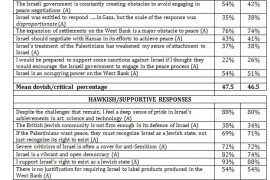Israelis can freely go to bookshops anywhere in the country and purchase”Borderlife,” by Dorit Rabinyan, a controversial novel featuring a Israeli-Palestinian love affair. Israeli youths can also borrow the book from libraries and bring it to school, and Israeli teachers in advanced literature classes across the country are free to assign the book to their students.
In other words, there are no restrictions on Israelis who wish to read ‘Borderlife’.
So, what has elicited widespread UK media coverage concerning the book?
It pertains to an Education Ministry decision not to make it required reading within the official Israeli curriculum.
This is of course a big step from ‘banning’ the book or anything that can be honestly characterized as “censorship”.
Though the banning of books is common in the non-democratic world, the American Library Association (ALA) documents instances of book banning in US schools and school districts over the years. This has included the physical removal of books from schools – including some classics, such as To Kill A Mockingbird, Catcher in the Rye and The Adventures of Huckleberry Finn – based on complaints from parents or concerned groups over ‘inappropriate content’.
Naturally, such important distinctions – between censoring a book and merely not requiring that it be read – were lost on UK news editors in their furious race to use the non-story to buttress their narrative alleging a dangerous extreme right, anti-democratic trend in Israeli society.
Though some news outlets grudgingly acknowledged that the book wasn’t banned as such, as least if you carefully read the entire article carefully, others seemed to go out of their way to hide this important fact.
Among the worst violators was Times of London:
Indeed, the article by Catherine Philp doesn’t at all clarify the remarkably misleading headline and opening claim that “Israel’s education ministry has banned” the book “from being taught in schools”. (Philp also claims that the ministry’s statement on the book cited a fear that it would promote “miscegenation”. However, it did not cite “miscegenation”. It cited “assimilation” (התבוללות). The word “miscegenation” of course possesses more racist conotations than “assimilation”.)
An article at The Telegraph by Inna Lazareva is only slightly better. The headline and opening sentence also falsely claim that the book was “banned” from Israeli classrooms. Only later are we informed that officials merely “disqualified the book” from being added to the school curriculum.
An extremely tendentious article at The Independent by Ben Lynfield also erroneously claimed in the headline that Israel “banned” the book from schools. However, in the second paragraph, readers are told that the book was merely “excluded from school literature curriculums”.
Interestingly, the Guardian’s headline and text in an article about the row – “Novel about Jewish-Palestinian love affair is barred from Israeli curriculum” – was the most accurate of the four major British news sites wer reviewed.
As my colleague Tamar Sternthal clearly explained in a post today about coverage of the incident at Haaretz:
The Education Ministry opted not to include the book in a high school curriculum, overruling an earlier decision from the ministry’s professional advisory committee to include it. But deciding to exclude a book from a curriculum is hardly tantamount to a “ban.”
Once again, it appears that editors and journalists have allowed their personal biases, prejudices – and a weakness for sensationalism – to get in the way of clear, careful and professional reporting.
We intend to challenge editors on the inaccuracies noted above, and will update you accordingly.






